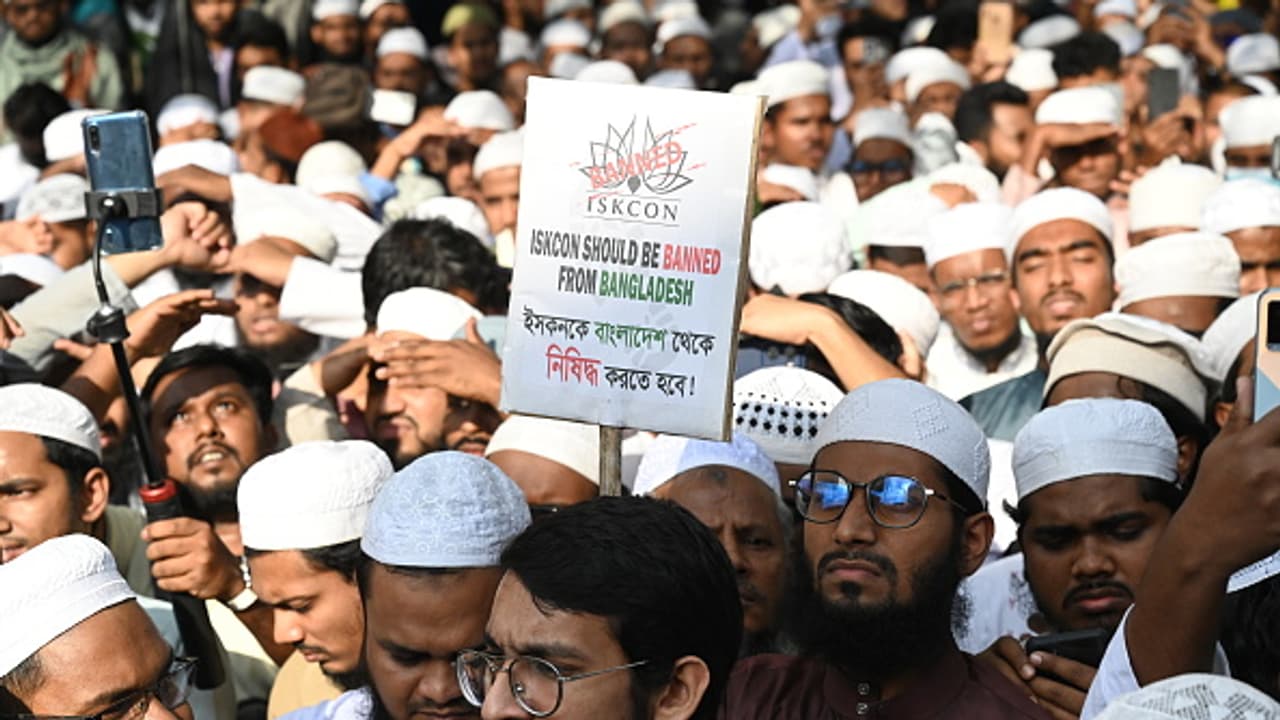Thousands of Islamist protesters in Bangladesh, backed by radical groups such as Hefazat‑e‑Islam Bangladesh and Intifada Bangladesh, demanded an immediate ban on ISKCON, labelling it an ‘extremist Hindutva organisation.
After Friday prayers, large crowds gathered in Bangladesh’s Dhaka and Chattogram demanding a nationwide ban on ISKCON. Organisers included radical groups like Hefazat-e-Islam and Intifada Bangladesh. Protesters marched in front of major mosques such as the Baitul Mukarram National Mosque in Dhaka and the Anderkilla Shahi Jame Mosque in Chattogram, chanting slogans and presenting demands including legal action against ISKCON.
Scroll to load tweet…
Anti-ISKCON movement in Bangladesh: Who is involved and what they claim
The demands were led by Islamist organisations. For instance, at the Dhaka rally, Intifada Bangladesh listed six demands; one was the immediate ban of ISKCON. At Chattogram, a leader from Hefazat-e-Islam said: “Just as the Awami League has been banned, ISKCON as an extremist organisation must also be brought under the law.”
Another speaker accused ISKCON of acting as ‘an agent of India, engaged in subversive activities against Muslims’.
The legal and political backdrop The rallies come amid a petition in Bangladesh’s High Court seeking ISKCON’s ban. The interim government led by Muhammad Yunus has described ISKCON as a ‘religious fundamentalist organisation’ in its response to the petition.
This escalation follows the August 2024 fall of former Prime Minister Sheikh Hasina, after which Islamist groups appear to have gained more influence in Bangladesh’s political life.
Why ISKCON is being targeted
Protesters accuse ISKCON of a range of alleged wrongdoings: land grabbing, money-laundering, acting on behalf of India, and creating a “Hindutva” network in Bangladesh. However, ISKCON reports its work in Bangladesh has included humanitarian efforts: feeding large numbers of people following the Liberation War, running schools, orphanages and medical camps.
Scroll to load tweet…
Scroll to load tweet…
Scroll to load tweet…
The targeting of ISKCON is part of a wider concern about the treatment of Hindu and minority communities in Bangladesh. Minorities report attacks on temples and religious centres, and growing unease over how the interim regime is responding or failing to respond. A recent report said that under Yunus’s government, Islamist groups have been able to grow in political strength and influence.
The escalating demand to ban ISKCON
The demand to ban ISKCON signals a sharp escalation in religious and communal tensions in Bangladesh. If the government acts, it could mark a significant shift away from secular protections for religious minorities. For India and other neighbours, the situation raises concern about regional stability and minority safety. It may also affect diplomatic ties, especially if allegations of targeting an India-linked organisation become international issues.
The High Court petition is active, and the government has already provided a legal description of ISKCON as ‘religious fundamentalist.’ Further legal action may follow. International and local human rights groups are watching closely. If ISKCON is banned, the precedent might extend to other religious groups, raising questions about freedom of religion and minority protections in Bangladesh. Meanwhile, ISKCON and its supporters will likely respond with legal challenges and public appeals. The next days will show whether the interim government backs the ban or resists pressure from Islamist groups.
Thousands of protesters in Bangladesh have demanded an immediate ban on ISKCON, calling it an extremist Hindutva organisation. Their actions reflect larger shifts under the interim government led by Muhammad Yunus, where Islamist groups appear to be gaining ground. What started as demands about one organisation may now point to deeper changes in religious freedom, minority rights and political alignment in Bangladesh. For many observers, the coming decisions will tell us whether Bangladesh will protect its religious minorities or enter a new era of religious majoritarian politics.
